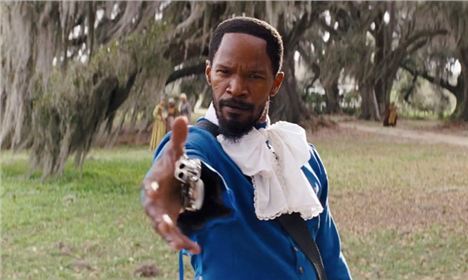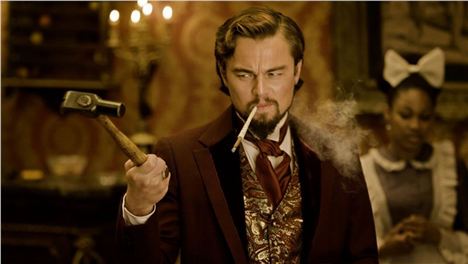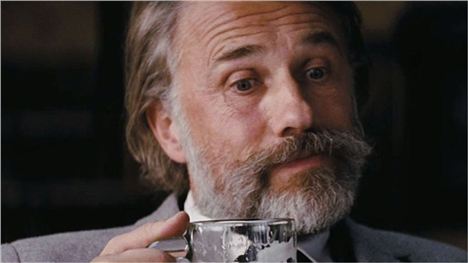QUENTIN Tarantino has paid homage to plenty of genres before now: the gangster (Pulp Fiction), martial arts (Kill Bill: Vols 1 & 2), the grindhouse horror (the underrated Death Proof).
Now he’s revived the spaghetti western with his usual fanboy enthusiasm. Whatever the subject, it’s always a Tarantino. Expect nods to obscurities and the gratuitous use of profanity and gore.
You know from the offset that the villains of the piece are going to be pretty despicable bastards
In pre-Civil War Texas, German bounty hunter Dr King Schultz (Christoph Waltz) buys and frees slave Django (Jamie Foxx). In exchange for Django helping him legally claim bounties (favouring the “dead” over the “alive” option on the wanted posters), Schultz agrees to help him find and free his wife Broomhilda (Kerry Washington).
Unfortunately, she’s working on the notorious Candyland plantation in the Deep South, Mississippi, and owned by Calvin Candie (Leonardo DiCaprio) who enjoys sweets and bloodsports in equal measure.
Django Unchained is a collage of westerns past – even the eponymous lead’s name is taken from a 1966 Italian western. Although, as is usual with Tarantino, you don’t need to be a buff to enjoy it.
The writer/director loves his violence almost as much as he loves uninterrupted, drawn-out monologues. There are gallons of blood, exploding body parts and unflinching cruelty – but Tarantino succeeds where another could fail – because none of this feels overly gratuitous.
This is partly because of the dark comedic aspects that are peppered throughout.
Largely, however, the brutality is balanced with dialogue-heavy scenes. While these do make the film much longer than it needs to be, they are also one of the core reasons that Django Unchained strikes such an unflinching chord. Whenever a character is feeling particularly effusive, the breathless audience knows bloodshed is never far away.
From the moment Foxx's bedraggled Django, with his thousand-yard stare, steps out of the shadows and into Schultz’s lamplight, you forgive him for 2010’s Valentine’s Day. His Django is a damaged man, capable of both incredible violence and being incredibly childlike (cold hearts will melt when he eagerly requests a folktale from a taken aback Shultz). It’s down to Foxx that the audience stays with Django as the character crosses into the morally dubious territory that Tarantino revels in.
Washington has now proved her merit after the appalling A Thousand Words. Her performance as the abused Broomhilda is subtle and heart-breaking. But this is where the film falls short. Tarantino knows how to write strong women – Jackie Brown, The Bride – but, despite being the object of Django’s bloody quest, Broomhilda is underwritten and her character never really shines through the trauma she endures.
Tarantino has no qualms about making killers his protagonists – so you know from the offset that the villains of the piece are going to be pretty despicable bastards.
DiCaprio’s plantation owner, Calvin Candie, is handsome on the outside but his decaying teeth say there’s something rotten at his core. Leo’s portrayal of the bubbling sadism beneath the plantation owner’s charming veneer is torturously good. He makes the character so volatile that you never know when violence is going to suddenly and viscerally erupt around him. Samuel L Jackson’s turn as Candie’s doddering henchmen also adds to the edge of unpredictable menace.
But the film belongs to Christoph Waltz’s doctor-turned-bounty hunter. From the terrifyingly unpredictable Colonel Hans Landa in Tarantino’s Inglourious Basterds (2009) to Schultz, the gentleman killer that amiably and unwaveringly gets the job done, Waltz is worryingly at home in Tarantino’s world. You hang on to his every meticulously enunciated word as he gives an enthralling performance that keeps you guessing all the way through.
You only need to see that the soundtrack features a James Brown/2Pac amalgamation to know this is no traditional western. Although it’s too long and arguably self-indulgent, Tarantino’s mix of personal jukebox and loving pastiche might even give him a commercial success.
8/10













